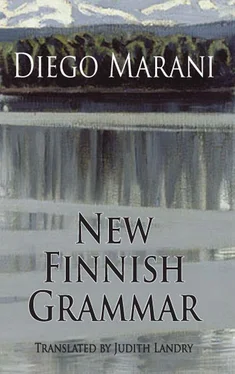‘I’ll write to you when I’m in Viipuri,’ said Ilma, almost as though to reassure herself she could still speak.
‘And what will you write about?’
‘Memories,’ she said, laughing loudly now, as though by way of reproach.
‘Do you at least promise that you’ll answer?’
‘I promise,’ I said, barely audibly.
Now we were back on the Mannerheimintie, plodding along side by side in silence, heads bowed. A distant strip of grey above the sea marked the start of a hard-won dawn: soon light would trickle from the close mesh of the sky, casting its faint glow over what was left of the snow, over the muddied earth. In the open space below us, black motorized columns were crawling over the snow like snakes, breaking up and reforming, breathing out steam. A hoarse whistle broke the silence; the lights of the station were coming closer, there was the sound of the odd engine in the distance. Suddenly Ilma took my arm again and broke into the Porilaisten marssi , but her voice was thick with emotion and I had trouble making out the words. I tried to join in, to keep her company, to cover her voice with my own, but my head was heavy and I found that the words were suddenly beyond me. Outside the main Post Office, an elderly man on the other side of the road stopped in his tracks to look at us. He was well-dressed, and wearing a fur hat; he took off his gloves, hooked his walking-stick over his arm and started to clap. The walls of the Post Office building sent his solitary applause echoing back to us; amplified by the silence and filling the square with that martial sadness that bodes defeat, it stayed with us as we walked under the lanterns clasped in the bronze hands of the colossal statues on the station façade. The troop train for Viipuri was already on the platform. The whole place was in ferment: soldiers in brand new uniforms and gleaming helmets were boarding by the dozen, amidst much stamping of feet; groups of nurses gathered around their luggage were seeking each other out and gesturing to one another. A loudspeaker was barking out names and destinations. I said goodbye to Ilma before she got on to the train: I could not bear the idea of seeing her leaning out of the window. Amidst all that bustle I quickly pulled off my gloves, took her hand and squeezed it hard, then fled, without another glance.
The Porilaisten marssi is indeed a song that speaks of war and banners fluttering over battlefields; I hummed it again to myself, alone this time, looking out over the frozen bay, in the snow-covered Kaivopuisto Park, standing motionless next to the tree of memories. I sang it loudly under the cold covers until alcohol and exhaustion won out in the fight against anxiety.
Here the manuscript is strangely blank, with just the odd disjointed phrase, Ilma Kovisto’s address in Viipuri and the text of the Porilaisten marssi. I felt that it should be included here, not just for documentary completeness, but because of what it also means for me: exile, the absurdity of war and all its menacing allure, personal defeat. Glued on to the back of this page I also found the programme of the benefit-concert given on 24 March 1944 by the choir of the Lotta-Svärd at the hotel Kämp. Apart from the Porilaisten marssi it also included the following pieces: Oi kallis Suomenmaa, Jääkärimarssi, Isänmaalle, Suomalainen rukous, Laps’ Suomen, Siniristilippumme, Terve Suomeni maa, Vala and Olet maamme armahin Suomenmaa. The pianist in the over-large uniform was Sergeant Veijo Vihanta, from the corps of frontier guards. The unknown soldiers belonged to the native Karelian Brigade, which was decimated on Lake Ladoga in June 1944.
After reading these pages I too went to the tree of happy memories; and I too found my own. In summer I used to go to play near it as a child, in the copse next to the Observatory. After school my mother and a woman friend would take me to the park and sit there chatting, while I would set about playing with a vengeance. On the esplanade behind the port I would create a world of my own, full of adventure, hiding behind the hedges and secretly observing the park keeper as he sat on a bench eating his lunchtime herring. He would take off his hat with its shiny leather brim — how I envied him that hat — and set the table with his thermos of coffee, a packet of herrings and a screw of paper containing berries. I was a bloodthirsty Viking who had recently landed on those shores in order to put the city to the sword. I would take the park keeper prisoner and drag him in chains to the president’s residence, like the slaves of Sigtuna in the coloured illustrations in my reading-book. Then I would rush off to sink the enemy ships as they rode at anchor in the port. But no sooner had I gone down the hill again than I would come face to face with my mother, who would grab me firmly by the arm, complaining that she had been calling for me for quite some time. My love affairs, on the other hand, would be conducted elsewhere, in the streets behind the harbour at Pohjoissatama, between Kruununhaka and Tervasaari, where I would hide in doorways, never weary of clasping a body which, by virtue of repeated embrace, I deluded myself that I might cause to enter mine. But I didn’t go down there: I want the memory I still have of those places to remain intact, softened by time, cleansed of all pain. Perhaps, indeed, the day will come when memory will ebb away from those images too, letting them fade into oblivion. Here I agree with Miss Koivisto: never to forget anything would be unbearable.
Porilaisten marssi
Pojat, kansan urhokkaan,
Mi Luolan, Lützin, Leipzingin
Ja Narvan mailla vertaan vuoti,
Viel’on Suomi voimissaan,
Voi vainolaisen hurmehella peittää maan.
Pois, pois, rauhan toimi jää,
Jo tulta kohta kalpa lyö
Ja vinkuen taas lentää luoti.
Joukkoon kaikki yhtykää,
meit’entisajan sankarhenget tervehtää.
Kauniina väikkyy muisto urhojemme,
Kuolossa mekin vasta kalpenemme.
Eespäin rohkeasti vaan,
Ei kunniaansa myö
Sun poikas milloinkaan!
Uljaana taistolippu liehu,
Voitosta voittohon
Sä vielä meitä viet!
Eespäin nyt kaikki, taisto alkakaa,
Saa sankareita vielä nähdä Suomenmaa!
Although we had a relationship of mutual trust, the pastor had never asked me about my accident in as many words; he had never made any reference to my short past, but I knew he was aware of it — he had read Doctor Friari’s letter, which was kept in the archives in the reception area, in the grey folder, still without a name. In his dealings with me, Koskela always tried to act with the utmost naturalness. But he could never treat me quite like one of his own: my story was too mystifying, my condition too anomalous. So he ended up by treating me as a sort of student of his language for whom he had been called upon to devise an intensive course in quintessential Finnishness. With teacherly resolve, he tried to focus my attention on the simple things of everyday life; he tried to show me that the mundane here-and-now — that area where my humdrum mind was floundering — was indeed all man can truly know. But he himself was unconvinced of what he was preaching, because he too had a present without a future. The pastor lived every day as though it were an act of obligatory unpaid labour — as though it were his last, as though everything had to be set out in perfect order prior to death. His true aim, in all likelihood, was to nudge me towards a place where I would be able to survive on my own; to edge me out of that dull despair which is the prelude to madness. But his instinctive cynicism showed through at every turn. That avoidance of regret, which he imposed upon me like some spiritual exercise, together with his blind conviction that each day would be the last, turned my existence into a mad rush towards nothingness. Each hour spent with the pastor was so intense, so thought-provoking, that there was no room for dread. In that portion of my thoughts that I had put in the pastor’s care, no doubts could grow: nothing grew there. Without realizing it, I was marching beside him, escorting him to his own end.
Читать дальше












